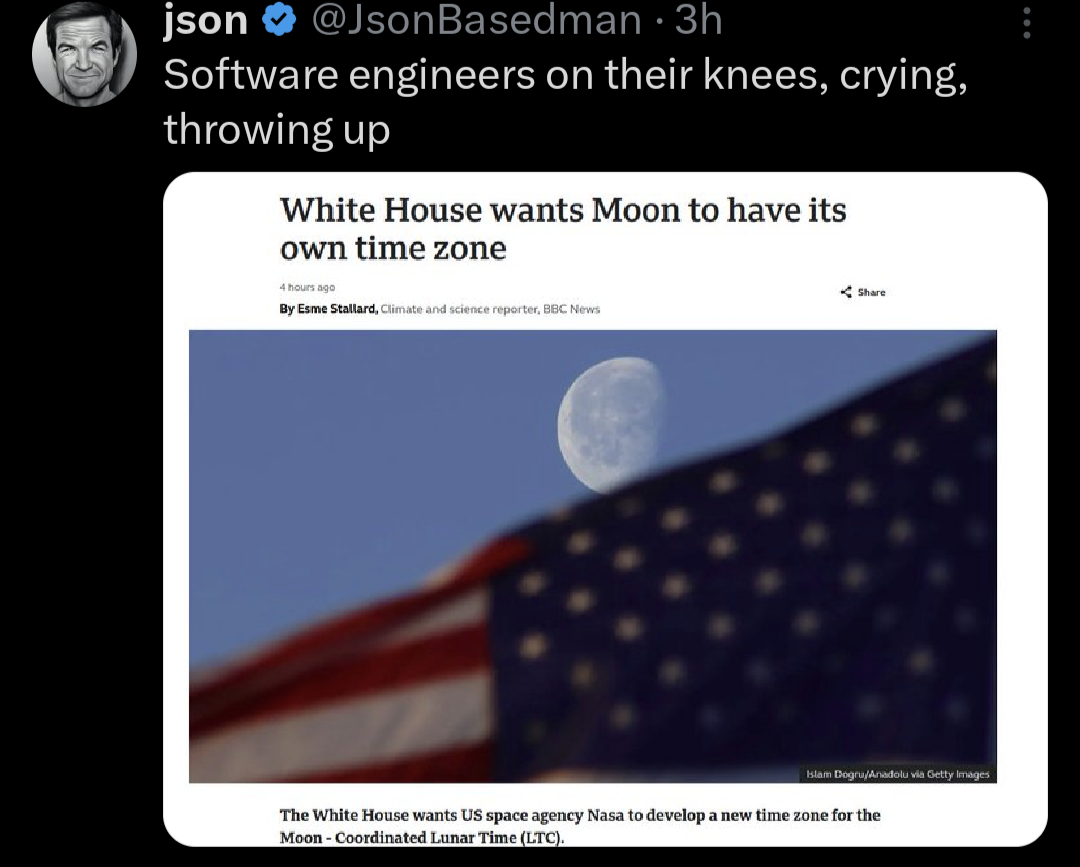this post was submitted on 17 Apr 2024
1453 points (98.6% liked)
Programmer Humor
20006 readers
422 users here now
Welcome to Programmer Humor!
This is a place where you can post jokes, memes, humor, etc. related to programming!
For sharing awful code theres also Programming Horror.
Rules
- Keep content in english
- No advertisements
- Posts must be related to programming or programmer topics
founded 2 years ago
MODERATORS
you are viewing a single comment's thread
view the rest of the comments
view the rest of the comments

No, the moon's rotation isn't on a 24-hour cycle. I'm not an astronomer, but I pretty sure since it's tidally locked to earth and on a 28-day cycle around the earth, a lunar day is actually 28 Earth days, but I'm not actually sure how that would factor into the number of time zones (I'm pretty sure it would be more complicated than just 24 time zones to match 24 time zones on earth, though).
Plus, I think the speed of the moon relative to the sun is different enough from Earth that you need to take relativity into effect, which is the real headache here.
It's pretty simple, actually. The time zones are on average 1 hour apart. So there should be about 24*28=672 time zones on the Moon. SIMPLE.
Or we invent 24 lunar hours and then we're back to 24 timezones.
However I don't think keeping the sun overhead at noon is the goal here. That stuff is only important to humans. The real issue is figuring out how to count time on the moon in such a way that it doesn't run out of sync with how we count time on earth because of relativistic effects.
The relativistic effects would be so small in human terms that the clock could just be synchronized with Earth time once daily and nobody would ever notice.
Pretty sure it's both pointless and impossible to have an earth-like timezone system in an object that has coordinated rotation and translocation cycles. Meaning this mess we call "timezones" shouldn't exist in the moon.
Shouldn't exist anywhere
article
It's possible that they don't end up putting atomic clocks on the moon, but it's on the table, they haven't worked out the details yet.
Even if you just count UTC offsets, there's 38 time zones: https://en.m.wikipedia.org/wiki/Time_zone
There's more than that though, due to Daylight Saving Time. The rules for DST are part of the definition of the time zone. For example, in Australia, Queensland and Victoria are both UTC+10. However, Victoria observes DST while Queensland doesn't, so technically they're two separate timezones (in the Olsen database, they're
Australia/MelbourneandAustralia/Brisbanerespectively).Yep, relativity accounts for a difference of like 50ms drift per earth day. I would assume that it's forward drifting if you're on earth but backwards if you're on the moon.
Take that, timezone whiners!
It's been a long time since I took modern physics, so I'm not positive, but I think you're right that the moon would have time moving slower, and if your 50ms/day is right (edit: I based this on the moon traveling faster than the earth, but I don't know anything about gravitational relativity, so that's probably wrong) then you'd need to do something like skip a second every 20th day on the moon to keep pace with Earth. We could call it an "anti-leap-second"
Programmers, that seems pretty simple; what's the big deal? ^/s^
HORROR
We're close to skipping a second too here on earth since the Earth had actually sped up a bit the past decade.
i heard, can't wait for satellites to fall out of the sky because of this one second